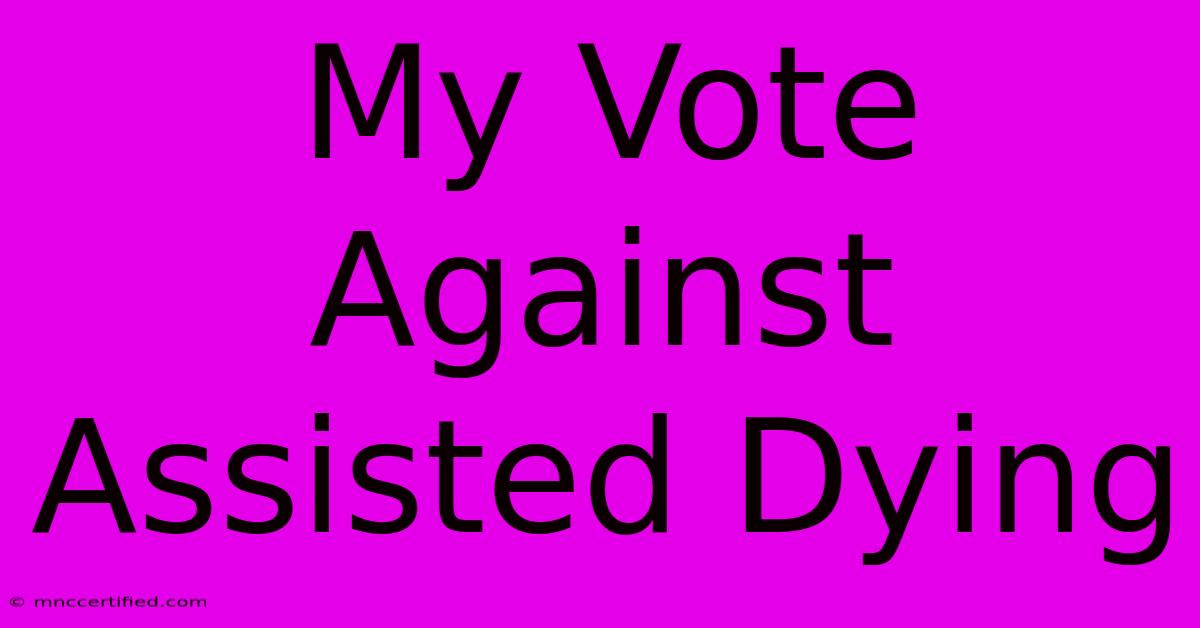My Vote Against Assisted Dying

Table of Contents
My Vote Against Assisted Dying: A Matter of Conscience and Care
The recent debate surrounding assisted dying has been deeply personal and profoundly challenging. While I understand and empathize with the suffering of those facing terminal illnesses, I ultimately voted against the legalization of assisted dying, and I want to explain my reasoning transparently and respectfully. My decision was not made lightly, and it stems from a complex interplay of ethical, moral, and practical considerations.
Understanding the Complexity of Assisted Dying
The arguments in favor of assisted dying are often compelling. Proponents emphasize patient autonomy, the right of individuals to make choices about their own lives, especially in the face of unbearable pain and suffering. They highlight the importance of dignity in death and the desire to avoid a prolonged and agonizing end-of-life experience. These are valid and deeply human concerns.
However, my concerns center around several key areas:
The Slippery Slope Argument: A Realistic Concern?
One of my most significant reservations is the potential for a "slippery slope." While the initial intention might be to provide assistance only to terminally ill adults with unbearable suffering, there's a risk that the criteria could gradually expand to include individuals who are not truly terminally ill, or who are vulnerable to coercion. The safeguards proposed, while well-intentioned, might not be sufficient to prevent unintended consequences. This is not about a lack of trust in medical professionals; it's about acknowledging the inherent complexities and potential for unforeseen challenges in a system designed to grant such a profound power.
Vulnerable Populations and Coercion
Another major concern relates to vulnerable populations. Individuals facing financial hardship, social isolation, or pressure from family members might feel compelled to choose assisted dying, even if they wouldn't otherwise. Ensuring truly informed consent becomes exponentially more difficult when addressing systemic inequalities that could influence an individual's decision. Robust safeguards are crucial, but even the most stringent protections can't entirely eliminate this risk.
The Role of Palliative Care: Addressing Suffering
It's crucial to remember that advancements in palliative care offer significant comfort and relief to those facing terminal illnesses. While not a cure, palliative care focuses on managing pain, symptoms, and emotional distress, providing a holistic approach to end-of-life care. Investing in and expanding access to quality palliative care should remain a priority. It represents a compassionate alternative that addresses suffering without resorting to ending life. The focus should be on improving the quality of life, not just hastening its end.
The Irreversibility of Death
Finally, the inherent irreversibility of death underscores the gravity of this decision. Medical errors happen, and treatments improve. Once the decision to end a life is made, it is final. This finality necessitates the highest degree of caution and careful consideration.
A Commitment to Compassionate Care
My vote against assisted dying does not reflect a lack of empathy for those suffering. Rather, it reflects a deep commitment to protecting the vulnerable, ensuring patient safety, and upholding the sanctity of life. I believe that a society should strive to provide compassionate care and support for all its citizens, particularly during their most vulnerable moments. This involves investing in palliative care, strengthening support systems, and engaging in continued, thoughtful dialogue about end-of-life issues. The conversation must continue, focusing on improved care and support for those facing the end of their lives, not simply providing an easier route to death. The focus should remain on improving the quality of life, not hastening the end.

Thank you for visiting our website wich cover about My Vote Against Assisted Dying. We hope the information provided has been useful to you. Feel free to contact us if you have any questions or need further assistance. See you next time and dont miss to bookmark.
Featured Posts
-
Top 35 Black Friday Game Deals 2024
Nov 30, 2024
-
2024 College Football Boise Vs Oregon State
Nov 30, 2024
-
Savannah Bond Onlyfans Video
Nov 30, 2024
-
Sheffield United Vs Sunderland Which Channel
Nov 30, 2024
-
Bond Arms Derringer Problems
Nov 30, 2024